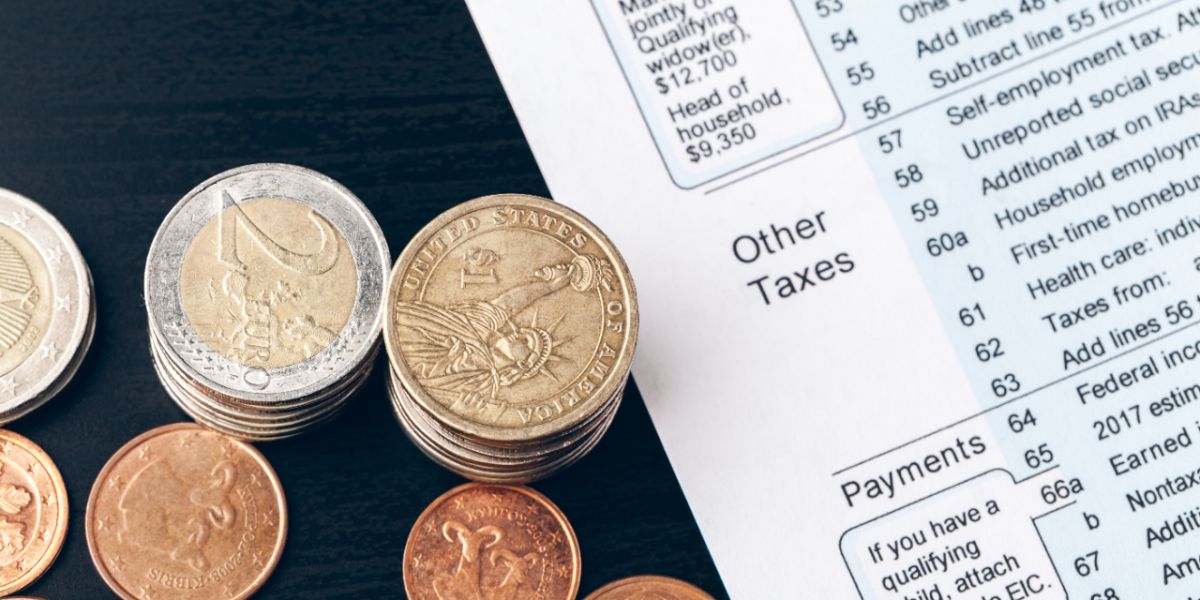
If you have just moved to Ireland or are planning to move, it's important that you have a clear understanding of how the tax system there works. We've put together a simple guide to help you navigate what can sometimes be the daunting and confusing tax system in Ireland.
The Irish tax system
The tax system in Ireland is a fair one, and it will depend on whether you are working for an employer or if you are self-employed as to the extent of taxes you will be liable for.
Not everyone needs to file tax returns. It is also important that you are aware of the tax system to ensure that you know how to set your finances up in such a way that is most beneficial for you.
If you are working in Ireland and you are an employee, you will be in the PAYE (Pay as you earn) system. This will see your tax obligations being automatically deducted from your pay check. For those who are self-employed, you will need to file and pay your own taxes.
If you are starting with a new employer, then you will need to provide them with a personal public service (PPS) number, as well as a completed tax credit certificate. You are able to apply for a PPS number as soon as you have received a job offer. This can be done at a PPS number centre, and you will need to produce proof of address and proof of identity.
The next step when you receive your PPS number is to register on the Revenue online platform. MyAccount is Revenue's self-service portal designed for individual taxpayers, particularly employees. It allows you to manage your taxes efficiently online without the need for complicated paperwork. From updating your details to accessing your Employment Detail Summary, MyAccount is a one-stop shop for all of your tax administration.
Visit Revenue.ie and click on the MyAccount tab at the top right corner to register. You'll need:
- Your Personal Public Service (PPS) number;
- Date of birth;
- Phone number;
- Email address.
When you have done so, your new employer will receive a tax credit certificate, which showcases what tax credits can be deducted from your tax bill. For those who are self-employed or have additional income to declare, you will have to file a self-assessment tax return.
Different types of taxes in Ireland
There are a few different types of taxes that are popular in Ireland. Your standard income tax will be levied at two tiers. This method ensures a fair system where those with higher incomes contribute a more significant percentage of tax. You will then have the likes of capital gains taxes on all gains you have made from investing in the likes of equities when you sell your positions. There is a universal social charge (USC) and pay-related social insurance (PRSI) that all earners have to pay, which contribute to funding public services such as hospitals, schools, and social welfare, as well as government operations in the country.
Universal Social Charge
The Universal Social Charge (USC) is a tax payable on your gross income, in addition to your personal income tax. It is calculated on a weekly or monthly basis. Currently, if your income is less than €13,000 per year, you are exempt from USC.
The USC rates (as of 2025) are as follows:
- Total income below €13,000 per year: No charge
- Income up to €12,012 per year: .5%
- Income between €12,012.01 and €27,382 per year: 2%
- Income between €27,382.01 and €70,044 per year: 3%
- Income over €70,044 per year: 8%
- Income over €100,000 (self-assessed income only): 11%
PRSI
Your social insurance contributions in Ireland are referred to as PRSI (Pay Related Social Insurance). Sometimes, you will hear people describe their PRSI contributions as stamps. This term dates from before 1979, when employers would literally stamp a card each week of employment.
Social insurance is money paid into the “Social Insurance Fund”. The Irish Government uses this money to pay for social welfare benefits and pensions. Most employees aged 16 and over pay social insurance contributions. The amount you pay depends on your earnings and the type of work you do. That is why it is called “Pay Related Social Insurance”.
Your employer is responsible for deducting PRSI from your pay. They also pay separate “employer PRSI contributions” for employees aged 16 and over. You can check your payslip for details of your PRSI contributions. If you are self-employed, you also pay PRSI, but at a different level. Your employer and the Department of Social Protection keep a record of PRSI contributions made by you and your employer.
Not everyone in Ireland has to pay PRSI. You are exempt from paying PRSI if:
- You are under 16 or over 70 years old;
- You are a part-time worker with weekly earnings between €38 and €352;
- You are sent to work in Ireland for a short time, you may not have to pay PRSI for up to 12 months if your country isn't in the EU or doesn't have an agreement with Ireland.
To see your PRSI contributions, log on to MyWelfare.ie and go to the Statements, Refunds and Repayments section, where you can request a contribution statement.
Tax rates in Ireland
The amount that you can earn before you start to pay the higher rate of tax in Ireland is known as your standard rate cut-off point, and any remaining income is taxed at 40%. For the standard level of income tax, you will be paying a tax rate of 20% on your income of up to €44,000 for a single person. Any income over this threshold will then be taxed at a rate of 40%.
For example, if you are single or widowed with no dependent children, and your annual income is €50,000, the standard tax rate will apply for €44,000, while the remaining €6,000 will be taxed at 40%. The thresholds change depending on your personal circumstances, for example if you are married, or in a civil partnership. There is also a higher threshold for single-parent households. The table below outlines the personal income tax rates as of 2025 in Ireland.
2025 | Amount taxed at 20% | Amount taxed at 40% |
Single and widowed person: no dependent children | Income up to €44,000 | Balance of income over €44,000 |
Lone parent | €48,000 | Balance of income over €48,000 |
Married couple with one income | Income up to €53,000 | Balance of income over €53,000 |
Married couple with two incomes | Income up to €88,000 | Balance of income over €53,000 |
Example of standard rate cut-off point for a married couple with two incomes
In 2025, the standard rate cut-off point for a married couple is €53,000. If both of you are working, this amount is increased by the lower of:
- The income of the lower earner,
- €35,000.
This means that one of you can have a cut-off point of up to €53,000 and the other can have a cut-off point of up to €35,000.
Take an example where one of you is earning €57,000 and the other is earning €37,000. The standard rate cut-off point for you as a couple is €53,000 plus an increase of €35,000. The increase in the standard rate band is not transferable between spouses, so the tax bands for 2025 would be:
- €53,000 @ 20% (= €10,600) and €4,000 @ 40% (= €1,600) for one of you,
- €35,000 @ 20% (= €7,000) and €2,000 @ 40% (= €800) for the other
Good to know:
The rates in the table above are subject to change based on the Irish Government policies and yearly budget decisions, so it's crucial that you stay updated on the current tax rates and bands in Ireland.
What are tax credits?
Tax credits reduce the amount of income tax you have to pay, depending on your personal circumstances. Everyone is entitled to a personal tax credit. Tax is calculated as a percentage of your income. Your tax credits are deducted from this to give the amount of tax that you have to pay. A tax credit will reduce your tax by the amount of the credit.
These are the different types of tax credits you may be eligible for:
- Personal Tax Credit – how much you'll get depends on whether you're single, married or in a civil partnership, widowed or a surviving civil partner, separated or divorced
- Additional tax credits which you may get if you're a PAYE employee, a carer, or 65 or above.
Some of the main tax credits available in Ireland in 2025 are as follows:
Tax credit | 2025 |
Single person | €2,000 |
Married person or civil partner | €4,000 |
Employee Tax Credit | €2,000 |
Earned Income tax credit | €2,000 |
Widowed person or surviving civil partner in year of bereavement | €4,000 |
Widowed person or surviving civil partner without dependent child | €2,540 |
Widowed person or surviving civil partner with dependent child | €2,000 |
Widowed Parent Tax Credit | €3,600 |
Single Person Child Carer Credit | €1,900 |
Dependent relative tax credit | €305 |
Home carer tax credit | €1,950 |
What income is exempt from tax in Ireland?
Certain types of income are exempt from income tax in Ireland, such as payments to approved pension schemes and statutory redundancy payments. You may be completely exempt from income tax if you, or your spouse or civil partner, are over 65 and your income falls below specific limits. However, you may still be liable for other taxes like the Universal Social Charge (USC) and Pay Related Social Insurance (PRSI). You may also be exempt from PRSI if you are over 66 years old.
Other types of taxes in Ireland
For the self-employed
Some of the taxes you will come across when you are self-employed in Ireland include:
- Income Tax: You'll pay income tax on your profits, depending on your income level. (Don't forget to register with Revenue as self-employed and file an annual self-assessment or tax return.)
- Universal Social Charge (USC): USC is payable on your gross income after relief for most capital allowances. The rate of USC varies based on your income level.
- Pay-Related Social Insurance (PRSI): Self-employed individuals pay Class S PRSI contributions. The rate is 4% of all income or €500, whichever is greater.
- Value Added Tax (VAT): If your annual turnover exceeds specific thresholds, you must register for VAT. The current thresholds are €75,000 if you supply goods and €37,500 if you supply a service.
Property tax
Local Property Tax (LPT) is an annual tax charged on the market value of your home. It is a self-assessed tax, which means you are responsible for working out your property's value and then submitting your return to Revenue.
How to pay income tax in Ireland
If you are an employee at a company, your income from this employment will be automatically taken out of your paycheck. If you have any other forms of income, you will then have to file a tax return.
Self-employed people will have to file their tax returns and pay their taxes every year. This is done through the Irish Revenue's online platform called ROS. You will calculate your own tax obligation and pay this sum, as well as a preliminary tax payment for the following year.
We do our best to provide accurate and up to date information. However, if you have noticed any inaccuracies in this article, please let us know in the comments section below.








